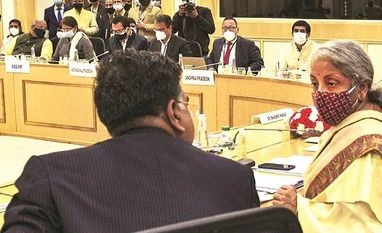At a pre-Budget meeting on Thursday, representatives of states told Finance Minister Nirmala Sitharaman that the Centre should increase its share of expenditure in centrally sponsored schemes, make higher borrowing limits for states unconditional, and should give direct income support to some sections of the society, among other recommendations.
However, one near-unanimous demand from states, including those governed by the Bharatiya Janata Party, was that the Goods and Services Tax (GST) compensation be extended for five more years, till 2027. This issue does not come under the ambit of the Union Budget but under the GST Council, which will meet on Friday.
On Thursday, Sitharaman and top officials from the ministry met representatives, including chief ministers and finance ministers, of states and Union Territories for the customary pre-Budget meeting in New Delhi.
“Our most significant demand is that Centre’s share in centrally sponsored schemes, which has gradually reduced and states’ share has increased, should be reversed. Earlier in some schemes, the Centre’s share would be 90:10 and now it is 50:50 or 60:40,” Rajasthan Technical Education Minister Subhash Garg told reporters on the sidelines of the meeting.
“There were many schemes, which were majority funded by the Central government but now it is 60:40. In some schemes 75:25 has been turned into 25:75 in favour of the Centre so this should be corrected,” said Chandrima Bhattacharya, the urban development minister of West Bengal.
Centrally sponsored schemes are the ones that are funded by the Centre and the states through a predetermined ratio. Such schemes include the National Rural Employment Guarantee Scheme (NREGS), Awas Yojana, Health and Education Missions, Jal Jeevan Mission, among others. Central Sector Schemes are those which are funded completely by the Central government.
Rajasthan recommended that the health and education schemes should be 100 per cent funded by the Centre, Garg said, adding that special packages to states should not be given only during the times of elections but also during crises, like the pandemic.
West Bengal’s Bhattacharya said that the Centre should consider direct income support for the poorest sections of the society, and that additional borrowing permissions to states should be freed up from any conditions.
This was echoed by Tamil Nadu Finance Minister P Thiagarajan. “I urge the Union Government to permit the States to borrow unconditionally within the prescribed limits. Further, as the States have incurred huge expenditure to fight Covid-19 with substantial reduction in revenues, I urge the government to permit borrowing of 5 per cent of GSDP without any conditions for 2022-23 fiscal (FY23),” Thiagarajan stressed. He also asked for a comprehensive financial package for micro, small and medium enterprises (MSMEs). “I strongly urge the Union Government to merge the cesses and surcharges into the basic rates of tax so that the States receive their legitimate share in devolution,” Thiagarajan said.
Since 2020, the Centre has provided states additional room to borrow from the bond market. However, this additional borrowing comes with a lot of pre-conditions. States are only allowed to borrow more if, for example, they show good progress on capital expenditure or carry out power sector or urban local body reforms.
The issue of extending GST compensation is something that was raised by states across party lines. “Many states have asked for this. We have also asked to extend GST compensation. If it is not extended, the finances of many states will be in a bad shape. Five years ago, common wisdom had decided that there should be compensation. Now that states’ finances have suffered due to the pandemic, common wisdom says that compensation should be extended,” Delhi Deputy Chief Minister Manish Sisodia said.
This view was aired by all the state ministers mentioned above, and Bhattacharya added that BJP-ruled states had also asked for extension of the compensation.
At the last Council meeting, Sitharaman had clarified the Centre’s stand that as per the GST (Compensation to States) Act, the compensation period is five years, which end in June 2022.
However, compensation cess will be collected till March 2026 to pay back the interest and principal of the Rs 2.69 trillion total that the Centre borrowed in FY21 and FY22, and transferred to states in lieu of the compensation shortfall. The states want compensation to be extended till June 2027.
Unlock 30+ premium stories daily hand-picked by our editors, across devices on browser and app.
Pick your 5 favourite companies, get a daily email with all news updates on them.
Full access to our intuitive epaper - clip, save, share articles from any device; newspaper archives from 2006.
Preferential invites to Business Standard events.
Curated newsletters on markets, personal finance, policy & politics, start-ups, technology, and more.
)